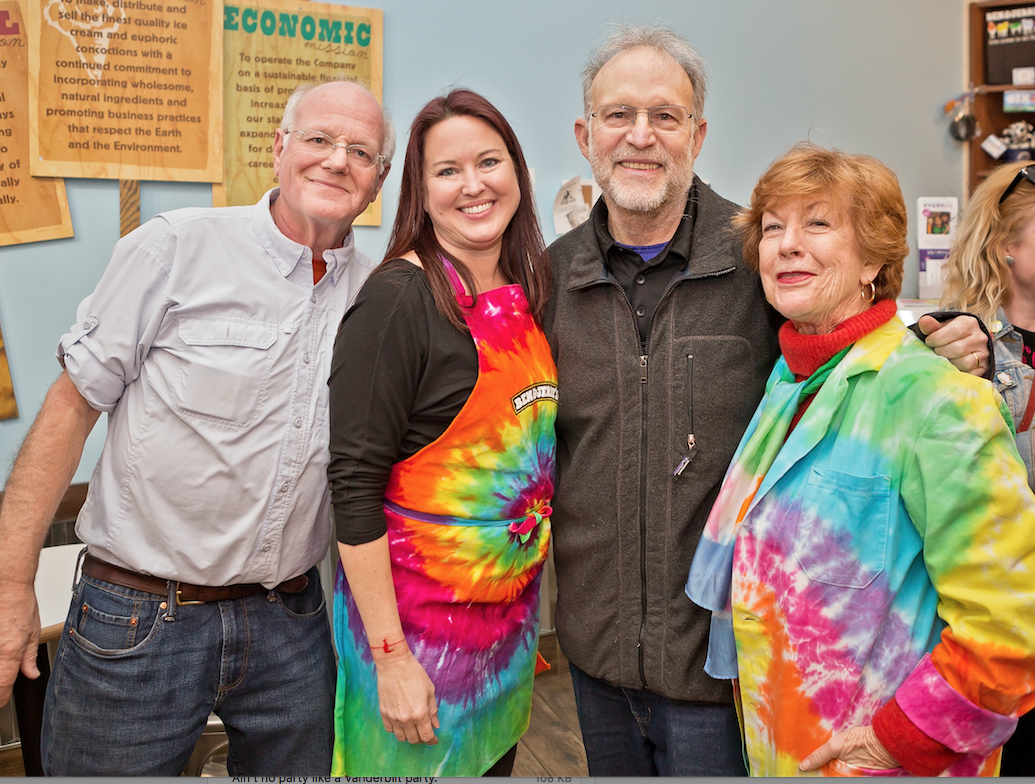Whether you eat it or not, there’s no denying fast food is part of our culture — 40 percent of Americans eat it on an average day, according to a report from the Centers for Disease Control and Prevention’s National Center for Health Statistics. This statistic may feel surprising in Asheville, a city that prides itself on its artisan food scene. But it turns out Western North Carolina’s relationship to food franchises is complicated.
Locals weigh in
Jenny Bunn, who works as marketing director for Asheville Community Theatre, admits, “I have a secret tradition. After opening night post-show parties for ACT, I drive through Taco Bell for two double-decker tacos and a Diet Pepsi.”
The habit started when she lived behind a Patton Avenue location of the multinational chain. She has since moved and no longer lives anywhere near a Taco Bell, but still, six times a year after each new show debuts at ACT, she finds one and hits the drive-thru. “I feel guilty because you’re not supposed to eat late, and why didn’t I eat the good food at the party I just left?” she muses. “Sometimes I skip the Diet Pepsi and have a local beer at home. That’s like halfway good, right?”
But Lockie Hunter, co-producer of the “WordPlay” radio show on Asheville FM, says that for ethical reasons, she avoids the temptation. “As a rule, my family doesn’t frequent fast-food places,” she says. “Many have business practices we don’t agree with, including one chain which infamously gives money to anti-LGBTQ organizations. In addition, many chains boast unhealthy packaging practices and food, advertising to low-income communities.”
Local retiree Robert May eats fast food for convenience on his way to meetings. “I don’t feel guilty at all,” he says, noting that he frequents Arby’s, Hardee’s and Dairy Queen.
Local stylist Blue Hughes is vegan and enjoys Taco Bell. “I’m a working mom with two small children in car seats. A drive-thru rocks my world,” she says. “I prefer local food. I feel guilty that my boys eat McDonald’s, but it’s convenient.”
She notes that if there was a vegan fast-food eatery that offered toys to young customers as McDonald’s does, she would eat there. “I understand why people want to keep it local, but when you’re tired and hungry, sometimes fast food is just what you need.”
Franzi Charen speaks from the perspective of the Asheville Grown Business Alliance, of which she is founder and director. “We advocate for locally owned independent businesses. We don’t include incorporated franchises. When we talk about ownership, we look at where power lies: the franchisee, which is the businessperson, and franchisor, which is the corporation. We feel most franchises aren’t looking out for the benefit of the local entrepreneur and community over corporate interests.
“I think people fall in love with Asheville because it’s unique and special,” Charen says. “So many places across the nation are becoming Anywhere USA. Local independent businesses preserve our culture. Local restaurants use local farms, local musicians play in local bars, which serve local beer, and it really makes a difference. Franchises and chains don’t enhance community culture. Often, they take away from it, extracting profits and sourcing externally.”
Talking shop
Yet behind many corporate franchises, there is a human — and very local — face.
After surviving breast cancer, Marcy Gallagher told her husband, “We need to get out of Florida and do something fun.” The couple had spent 20 years working at a large law firm in Fort Lauderdale, she as a paralegal, he as a lawyer, when they decided to move to Asheville, where they opened the downtown Kilwins ice cream and chocolate shop.

They had no business experience, so the franchise model was a perfect fit. Gallagher’s sister owned a Kilwins franchise in Florida. “I learned a little there,” Gallagher says. “I helped on big weekends. I always had fun in my sister’s store.”
Eleven years later, Gallagher still enjoys getting to know customers. “You meet people from all over the world, locals, too,” she says. “Some work downtown and need a sweet treat or want to take something home to the family. Montford locals often walk to the shop. We’ve owned the business so long, we’ve seen families grow. You can’t put a price on that.”
Gallagher’s business model includes giving back. “We’ve partnered with the Asheville Lyric Opera, Pisgah Legal Services, The Collider, and we give donations,” she says, noting that she also works with local schools, participating in career days and presenting chocolate workshops. “Being part of the community is a major part of what we do,” she says.
Gallagher employs seven to 15 people, depending on the season. For some of the younger staff, this is their first job. “I want to nurture these young people, give them a positive working environment and offer them skills that will be with them the rest of their lives.”
Customers are sometimes surprised to learn Gallagher is the owner. “I’m scooping ice cream, making waffle cones and handing out fudge samples,” she explains. “They ask why I’m working on a Saturday, and I tell them, ‘This is my business. I love it.’”
From the ground up
Nick Leatherwood is a hometown success story. Born and raised in Asheville, Leatherwood began his career at Chick-fil-A at Biltmore Square Mall at the age of 16. “I started to get close to a girlfriend. That went south,” he laughs. “I fell in love with Chick-fil-A instead.” Twenty-three years later, Leatherwood owns and operates the store on Merrimon Avenue, which grosses $5 million per year.
“Owner-operators may have different leadership styles,” he explains. “But it’s not like other chains where one owner has 25 stores. Most of us have one store. The most we can have is three.”
His store partners with nonprofits, including the Red Cross and Western North Carolina Rescue Mission, and hosts fundraisers for local schools. And out of about 1,600 Chick-fil-A franchises, Leatherwood’s store is one of 16 that are Leadership in Energy and Environmental Design-certified.
He employs roughly 80 people, and full-time staff members — meaning employees who work 35 hours per week or more — earn a living wage of $13 per hour. But this practice isn’t chainwide, he notes. He and other owner-operators in the Asheville market made this choice together.
“Average wages got us average people,” he says. “We wanted high-caliber people and low turnover, and we got it.” As the living wage standard increases, he says, he’ll match it.
Regarding the 2012 controversy surrounding statements about gay marriage made by Dan Cathy, son of Chick-fil-A founder S. Truett Cathy, Leatherwood says, “We’re here to serve all customers with different backgrounds, beliefs, anyone who comes in. We’re here to serve chicken.
“I believe hard work will get you somewhere,” he says. “I’ve set that precedent in my restaurant. If you come by, you’ll see me working. Truett said, ‘If you love what you do, you’ll never work a day in your life.’ Honestly, that’s what it is.”
The scoop
Julie Williams, co-owner of downtown Asheville’s recently opened Ben & Jerry’s Scoop Shop, lives in Waynesville and owns two other Ben & Jerry’s franchises in Tennessee. She loves the beautiful drive between her locations and is an active participant in day-to-day operations.
Before she became an owner in 2001, she worked in health care marketing. “I used to cry going to work every day. Now I get to sell ice cream,” she says. “It’s the happiest job you’ll ever have.” Like Gallagher, Williams had no prior business experience, so she found the franchise model ideal. She says the franchise owners and the corporate office get along like family.
In early February, Ben & Jerry’s founders Ben Cohen and Jerry Greenfield were in town for the grand opening of Williams’ store. The famous duo have been friends since seventh grade. “The key to our partnership,” says Greenfield, “is we’ve always been more friends than business partners. There’s a strong foundation of trust.”
When asked about opening a franchise in a city with such a local-focused mentality and loyalty, Greenfield says, “I think it’s wonderful that communities are loyal to their local shops.” Cohen adds, “We knew if we were going to expand and end up in other communities, the only way it would make sense would be because of our social mission.”
This year the company is focusing on front-end criminal justice reform and inequalities faced by low-income people and non-Caucasians. “For me, as a customer,” says Cohen, “I like to buy local or from a national company whose values I agree with and that’s using its power to be an advocate for social issues and inequities.” He cites Patagonia clothing company and its advocacy for environmental issues as an example.
At the grand opening, Williams partnered with Girls on the Run, giving out free ice cream to happy crowds and donating all tips for half a day. Since the store’s soft opening in August, Williams has partnered with Youth OutRight and Helpmate, and during the recent government shutdown, she gave free ice cream to government employees. A future partnership is planned with Big Brothers Big Sisters. “The secret sauce,” Williams says, “is the social mission — giving back to the community.”




Fast food may be easy, convenient. But it isn’t good for you and it isn’t good for this town. Buying local is a choice we need to make in order to keep Asheville unique. I do acknowledge that many franchise owners are local, but moving here from Florida to start a franchise does not qualify as local by any definition. It’s just a smaller version of those developers who’ve come from Florida to build hotels. Maybe they will come to care and know Asheville as the “locals” do, but it’s more about making money here. Probably from tourists from Florida. LOL. I want to say that I’m usually the first to say I’m down with the new development in Asheville because I remember when there was little more downtown than a XXX movie theatre and pawn shops. Definitely better now. Just be mindful throughout life!
For the most part, the majority of corporate fast food ( sometimes not so fast) doesn’t contribute much, except visual pollution, cheap, high caloric food, and lots of litter.
Every effort should be made to minimize it’s presence.
This holier than thou attitude with fast food is silly. It’s not for eating daily, but I feel zero guilt going to Arby’s or Chick Fil A, or wherever I choose to eat. Zero. I love to support local business as well. I shop at Walmart too btw. I’m a heathen I guess.